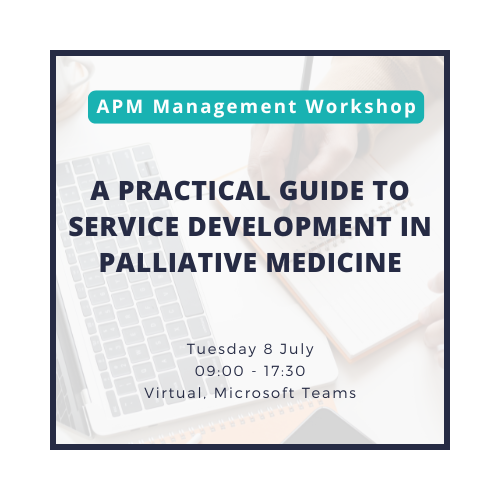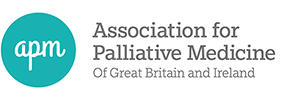
APM Management Workshop: A Practical Guide to Service Development in Palliative Medicine
Aim: To provide knowledge and skills in how to develop a new service/reconfigure services.
Objectives:
• To gain an understanding of the data and evidence required to identify service gaps and create a compelling business case, through the use of a structured approach
• To recognise the different departments and stakeholders to involve in the development of a service
• To develop competencies in applying effective methods for conducting service reviews.
Intended Audience: New Consultants, SAS Doctors and final year Trainees
Two scenarios to provide opportunity to put learning to practical use – a hospice-based scenario, and a hospital based scenario.
Tickets
APM Member £60
Non Member £80
Watch Back
We will be recording the tutorials only, so these will be emailed to delegates after the event. Breakout sessions will not be recorded.
CPD Accreditation
The ‘APM Management Workshop: A practical guide to service development in palliative medicine’ has been approved by the Federation of the Royal Colleges of Physicians of the United Kingdom for 6 category 1 (external) CPD credit(s).
Hourly Schedule
APM Management Workshop
- 09:00 - 09:30
- Introduction - Scene setting
- 09:30 - 10:15
- Part 1: Information gathering - Dr Alison Bacon
- Evidence and data
- 10:15 - 11:00
- Part 2: Who's who? - Iain Cameron
- How to get buy in? Networking and negotiating
- 11:00 - 11:30
- Break
- 11:30 - 12:15
- Part 3: Writing a business plan - Professor Fiona Rawlinson
- What is a business plan and how to write it
- 12:15 - 12:45
- All together discussion - Working in different settings
- Similarities and differences between hospice and hospital
- 12:45 - 13:45
- Lunch
- 13:45 - 14:00
- Introduction
- Afternoon plan
- 14:00 - 15:15
- Part 4 - Plan a business case
- 3 Groups. Facilitators Dr Katie Jerram, Dr Jamie Mayers and Dr Holly McGuigan
- 15:15 - 15:30
- Break
- 15:30 - 16:30
- Part 5 - Service review and reflections
- How to keep your service going. Examples of where it has worked and where it has not
- 16:30 - 17:00
- Part 6 - Review and reflection
- Panel to discuss what worked well/could be improved/answer questions


